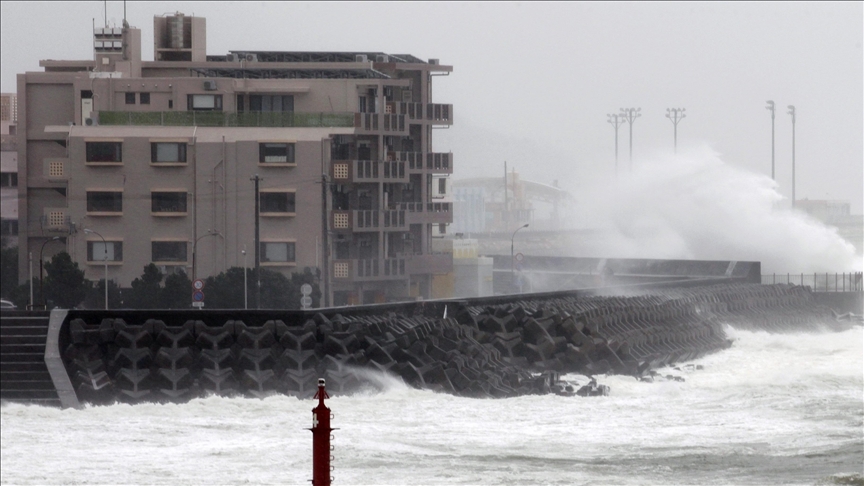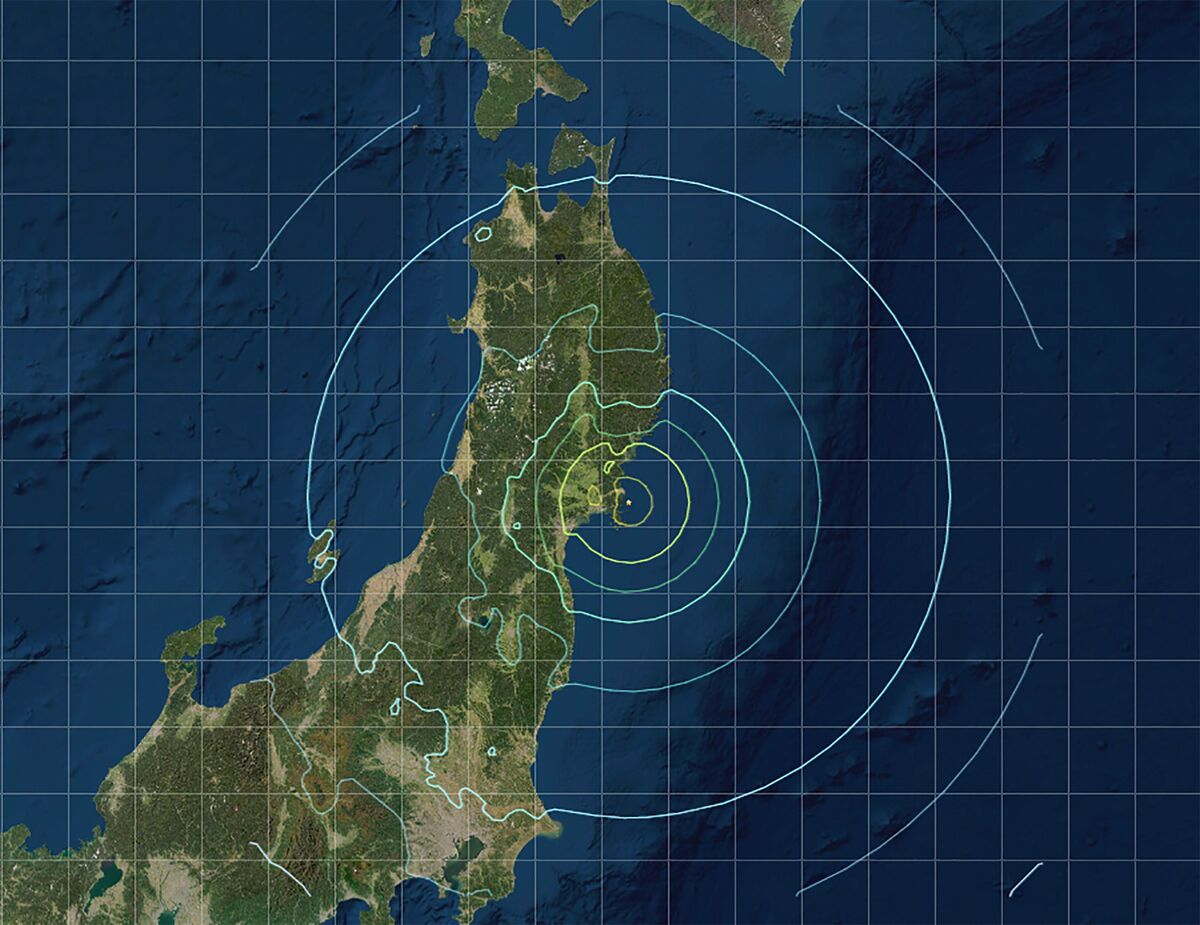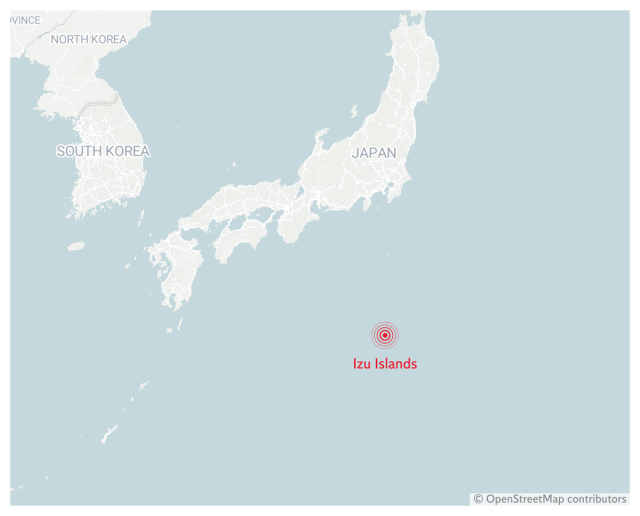Tsunami Alert Grips Japan as Series of Earthquakes Rattle Izu Islands

Tsunami Alert Grips Japan as Series of Earthquakes Rattle Izu Islands
In a startling turn of events, Japan finds itself on high alert as a relentless series of seismic activities has sent shockwaves through the nation. A tsunami alert has been sounded for the Izu Islands, an idyllic yet precarious archipelago off the eastern coast of Japan. This unnerving development comes on the heels of a 6.6 magnitude earthquake, leaving the Japanese meteorological agency no choice but to issue a cautionary forecast of waves reaching heights of up to 1 meter.
The island nation, known for its resolute spirit and preparedness in the face of natural calamities, now faces a daunting challenge. With more than fifteen earthquakes jolting the region, the people residing in coastal areas and near river mouths have been strongly urged to make a strategic withdrawal to higher ground. The urgency of the situation cannot be overstated, as the potential consequences of failing to heed this warning could be devastating.
The Izu Islands, renowned for their picturesque landscapes and pristine beauty, have been thrust into the global spotlight due to this alarming turn of events. The seismic unrest, though not unprecedented in this seismically active region, has generated widespread concern among both the populace and authorities alike.
The initial tremor, registering at a formidable 6.6 on the Richter scale, acted as a harbinger of the unsettling events that followed. This powerful earthquake struck at the heart of the Izu Islands, setting off a chain reaction of seismic events. While the 6.6 magnitude tremor may not be classified as a major quake, its ramifications were far-reaching. It served as a forewarning, prompting heightened vigilance and a swift response from Japan’s meteorological agency.
The persistent seismic activity, characterized by a series of aftershocks and tremors, has kept residents on edge. Each subsequent tremor, however minor, reignites fears and rekindles the urgency of preparedness measures. The waves of unease ripple outward, impacting not only the residents but also echoing across the nation.
The meteorological agency’s forecast of potential tsunami waves is a sobering reminder of the island nation’s vulnerability to the inexorable forces of nature. While the projected wave heights of up to 1 meter may appear modest in comparison to the towering tsunamis of the past, it is vital to remember that even seemingly insignificant waves can wreak havoc in densely populated coastal areas.
The imperative for residents to retreat to higher ground is a message that carries the weight of experience. Japan has borne witness to the unforgiving wrath of tsunamis on numerous occasions, most notably during the devastating 2011 Tōhoku earthquake and tsunami. The catastrophic events of that fateful day serve as an indelible reminder of the relentless power of nature and the necessity of preparedness.
The Japanese people, renowned for their resilience and unity, have responded to this latest crisis with characteristic fortitude. Evacuation efforts have been swift, with local authorities and emergency services working tirelessly to ensure the safety of those in harm’s way. The coordination of resources and the dedication of the response teams have been nothing short of commendable.
As the nation stands on the precipice of potential disaster, the world watches with bated breath. The international community, no stranger to Japan’s indomitable spirit in the face of adversity, stands in solidarity with the island nation. Offers of assistance and support have poured in from around the globe, a testament to the bonds of humanity that transcend borders.
Amidst the palpable tension that hangs over the Izu Islands, there is a sense of unity and purpose that defines Japan in times of crisis. Communities have come together to provide support to one another, illustrating the strength of the nation’s social fabric. Evacuation centers have been set up to accommodate those who have heeded the call to seek higher ground, offering refuge and essential supplies to those in need. It’s a testament to the nation’s preparedness that these centers have been swiftly established and equipped to provide for the well-being of their citizens.

The role of technology in disaster preparedness cannot be understated in modern Japan. The country’s advanced early warning systems have proven to be invaluable tools in mitigating the impact of seismic events. These systems can detect the initial tremors of an earthquake and issue alerts seconds before the more destructive waves arrive, offering precious moments for people to take cover or evacuate. The widespread adoption of these technologies underscores Japan’s commitment to safeguarding its citizens against the ever-present threat of earthquakes and tsunamis.
In the shadow of uncertainty, international cooperation has become a vital lifeline. Japan’s history with natural disasters has fostered a culture of knowledge sharing and collaboration. The lessons learned from past events, both within Japan and abroad, have informed disaster preparedness strategies worldwide. This collaborative spirit extends to the realm of scientific research, where experts from various nations work together to advance our understanding of seismic activity, tsunamis, and disaster mitigation.
As Japan continues to grapple with the evolving situation in the Izu Islands, the nation’s resilience is a source of inspiration. The resolve to confront nature’s wrath head-on and the commitment to protecting lives remain unwavering. With each passing hour, the Japanese people demonstrate that their strength lies not only in their technological prowess but also in their compassion and unity. As the world watches, they stand as a testament to the indomitable spirit of a nation that has faced adversity time and time again, emerging stronger with each challenge.

In conclusion, Japan’s Izu Islands find themselves in the grip of a tsunami alert following a series of earthquakes that have shaken the region. The seismic activity, though unsettling, serves as a stark reminder of the unpredictable forces of nature that shape our world. As the Japanese people rally together once more, their unwavering spirit and preparedness serve as a beacon of hope in the face of uncertainty. The coming hours and days will test their resolve, but with unity and resilience as their allies, they remain steadfast in their determination to weather the storm.





